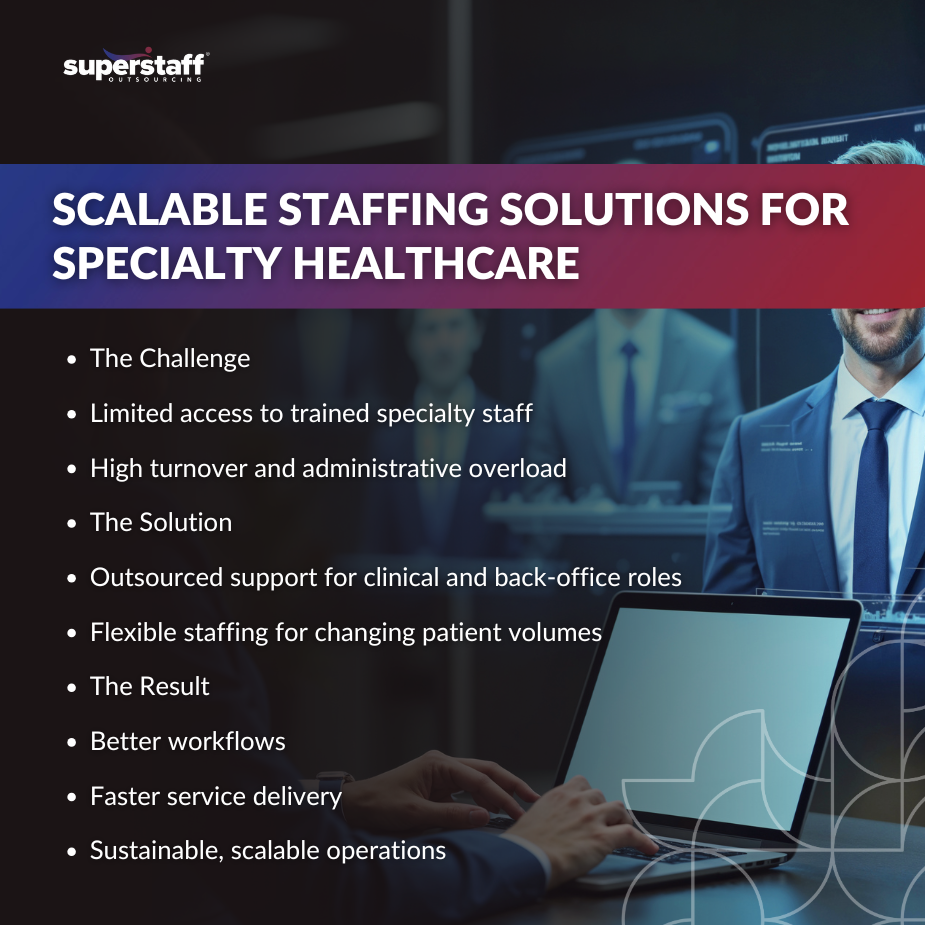
Healthcare doesn’t slow down, and neither do the staffing demands that come with it. Specialty healthcare providers often need more support than what in-house teams can handle. Whether it’s helping patients with complex needs or managing detailed records and claims, gaps in staffing can lead to delays, errors, and stress on the entire organization. The growing need for skilled professionals makes it even harder to keep up.
This is where specialty healthcare staffing through outsourcing becomes a practical solution. With the right support team, providers can meet growing patient needs, stay organized, and scale their services without constantly hiring and training new staff. This article breaks down how outsourcing can solve daily pain points and help specialty practices grow sustainably.

Why Staffing Gaps Affect Specialty Healthcare Providers
Even with the best intentions, many specialty healthcare providers find themselves short-staffed. This creates a domino effect that impacts both patient care and operational stability.
1. Short Supply of Specialized Talent
Many fields, such as oncology, cardiology, or behavioral health, require staff with very specific knowledge. The demand is high, but the pool of trained professionals is limited, making hiring more difficult.
2. Burnout in Clinical Teams
Medical professionals often take on extra duties when staffing is low. This can result in fatigue, lower morale, and even resignations, creating further staffing gaps.
3. Rising Patient Expectations
Patients expect efficient service, quick communication, and smooth appointment management. Without enough staff, it’s difficult to meet these expectations consistently.
4. Complex Administrative Tasks
Specialty practices manage detailed billing, pre-authorizations, and insurance claims. Lack of support in these areas slows down workflows and increases the risk of errors.
5. High Turnover Rates
Trained staff leaving the organization means added recruitment and onboarding costs. Frequent turnover breaks continuity in patient care and communication.
What Outsourcing Brings to Specialty Healthcare Staffing
Outsourcing can provide structure and consistency across different roles within a practice. It provides a practical approach to managing both clinical and non-clinical functions.
1. Healthcare Staff Augmentation
Providers can add experienced support staff without hiring full-time employees. This reduces internal strain while keeping operations smooth.
2. Remote Medical Assistants
These professionals can handle tasks like patient intake, appointment setting, and chart updates. They reduce pressure on clinical staff, allowing more focus on patient care.
3. Medical Billing and Coding Support
Trained billing teams manage claims processing, payment tracking, and denial follow-ups. This helps improve revenue cycle performance and reduces errors.
4. Patient Coordination and Scheduling
Outsourced teams help manage schedules, reminders, and pre-visit paperwork. This creates a better experience for both patients and front-office teams.
5. Insurance and Referral Management
Verifying benefits, submitting authorizations, and coordinating referrals become easier with dedicated staff. Timely processing helps avoid treatment delays.
Scalability Through Specialty Healthcare Staffing Solutions
Growth should not be limited by how many people you can hire. Outsourcing allows providers to scale their services without worrying about internal headcount or office space.
1. Flexibility to Handle Patient Volume Spikes
Outsourced teams can adjust quickly based on seasonal or unpredictable patient demand. This helps avoid long wait times and missed care opportunities.
2. Expansion Into New Locations or Specialties
Providers planning to open new clinics or add new services can scale faster with external support. This avoids the delay of recruiting and training new in-house staff.
3. Budget-Friendly Growth
Outsourcing to fill healthcare staffing shortages can reduce hiring and training costs. Practices only pay for what they need, making growth more cost-efficient.
4. Operational Stability During Transitions
Whether merging with another clinic or updating systems, outsourced support ensures business continuity. Tasks such as patient communication or billing don’t stop during transitions.
5. Faster Ramp-Up Time for New Services
Launching a new specialty or program is easier with pre-trained support teams. Teams are already familiar with workflows, which saves time on onboarding.
Keeping Quality and Compliance in Check
Many providers worry that outsourcing means losing control. However, reliable partners follow healthcare-specific guidelines and maintain high standards.
1. Process Transparency
Outsourcing providers share regular reports on task progress, volume, and performance. This ensures your team stays informed and in control.
2. Standardized Workflows
Call scripts, billing procedures, and documentation guidelines are all aligned with your clinic’s standards. This avoids inconsistencies and ensures quality service delivery.
3. Training in Healthcare Terminology and Systems
Teams are trained on EHR systems, medical terms, and specialty-specific processes. This ensures the staff understands the needs of the field they support.
4. Data Security Protocols
Reputable providers have clear security protocols for handling sensitive information. Files, systems, and communication tools are all protected by secure practices.
5. Consistent Quality Monitoring
Supervisors and quality teams review work regularly to catch issues early. Continuous training helps keep standards high across the board.
Industries That Benefit Most From Specialty Healthcare Staffing
Several medical fields benefit from outsourcing due to the complexity of care and the need for administrative accuracy.
1. Cardiology
This specialty involves high patient volume and strict billing timelines, both of which require strong support systems.
2. Oncology
Cancer treatment involves long care cycles and complex insurance approvals, making consistent administrative support essential.
3. Dermatology
With many short, procedure-based visits, this field benefits from efficient scheduling and patient communication.
4. Rehabilitation and Physical Therapy
Frequent appointments and progress tracking require constant coordination and documentation support.
5. Behavioral Health
Continuity of care, accurate records, and sensitive communication are critical in behavioral health, and outsourcing helps maintain that consistency.
Smarter Staffing for Stronger Specialty Care
Outsourcing is a practical way to overcome healthcare staffing gaps and prepare for long-term growth. From patient coordination to claims management, outsourcing helps specialty providers stay efficient without overextending their teams.
If you’re looking to build a stable, scalable model, specialty healthcare staffing with a trusted partner is a reliable next step.
Partner with SuperStaff to gain a support system that grows with your practice. Our experience in healthcare staff augmentation and our ability to support specialty clinics make us the right choice for those who want to deliver better care without getting overwhelmed. Let us help you fill the gaps, reduce stress on your team, and create a path toward sustainable growth.






